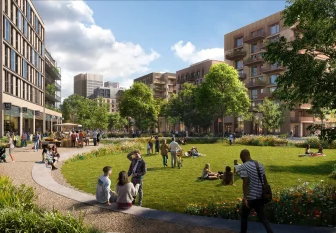 Tottenham Hotspur Football Club has lost a legal battle to stop a proposed £2bn mixed-used development opposite its north London stadium from being built.
Tottenham Hotspur Football Club has lost a legal battle to stop a proposed £2bn mixed-used development opposite its north London stadium from being built.
The Premier League took legal action over Haringey Council’s decision to giver housebuilder Leandlease the go-ahead to build 2,929 residential properties, and up to 445,000 sq ft of commercial and community space.
The council says it will provide a range of public benefits including parks, commercial space, a new library and hundreds of social-rent homes. But the plans have already been heavily criticised by some residents whose homes and businesses will be demolished to make way for the scheme.
But the football club’s lawyers argue that the planned High Road West development, located adjacent to the club’s 62,850-capacity stadium, failed to take “heritage impacts” and crowd control issues into consideration. However, High Court judge Sir Pushpinder Saini ruled in favour of the development, which is now expected to be completed in 2034.
However, in his ruling, High Court judge Justice Saini dismissed the claims. He concluded that the heritage impacts were “lawfully identified” and were “judged to be outweighed by the substantial public benefits which the scheme would deliver”.
He said that the council had reviewed material on crowd safety, sought advice from an independent expert, and “lawfully provided an overall mechanism whereby the key stakeholders would work together, acting reasonably and consulting key stakeholders, including the police”.

Justice Saini added that planning committee members “were not misled”.
In his ruling, he explained: “On the evidence before me, it is clear that in satisfying itself that it was appropriate to grant planning permission, the council reviewed the material on crowd safety submitted…and the criticisms of it put forward by the claimant; and it sought expert advice from an independent expert.
“The planning assessment of public benefits is clear. There is a clear development plan support for this development and the regenerative impacts of the scheme are of overwhelming significance in the planning balance.
“In my judgment, the council was lawfully satisfied that the planning permission created a framework, which would ensure that the access to the stadium (which was a key planning consideration) would be satisfactorily achieved without unreasonable impact on the claimant.”
Commenting on the ruling, David Joyce, director of placemaking and housing at Haringey Council, said: “We are pleased with the High Court judgement. The decision is an endorsement that the council’s planning authority acted lawfully in the granting of planning permission for the scheme.
 “This is the biggest regeneration programme in Haringey’s history, delivering 500 high-quality council homes as well as major investment in new open spaces, community facilities and local jobs and training opportunities. It is a new beginning for the community in Tottenham and delivering for them remains our top priority.
“This is the biggest regeneration programme in Haringey’s history, delivering 500 high-quality council homes as well as major investment in new open spaces, community facilities and local jobs and training opportunities. It is a new beginning for the community in Tottenham and delivering for them remains our top priority.
“As we take the next steps, we will continue to listen to the views of residents and local stakeholders and work together to shape the scheme’s design, the layout of the new homes and the community improvements.”
Earlier this month, the football club unveiled revised plans to build 287 student bedspaces in blocks up to six-storeys high near the stadium.
Spurs had previously been given consent for 72 homes, including 23 affordable homes, and a cinema on the site of a former printworks on Tottenham High Road, in January 2022.


The judge was probably a gooner! Seriously, though, that area is a dump. The new Spurs stadium has made a massive difference, but the area as a whole needs redeveloping, and this looks great. However, 500 new council homes?
I will put money on that 500 not happening. The developer will obtain Planning, start the development, then claim it will not be financially viable if they have to provide 500 council homes. The developer of the new Brentford FC stadium did just that, and Hounslow council accepted their argument, allowing them to build the stadium, a luxury hotel, and 900 apartments [no parking – sold mainly to foreign investors] with no S106!
You must be logged in to like or dislike this comments.
Click to login
Don't have an account? Click here to register